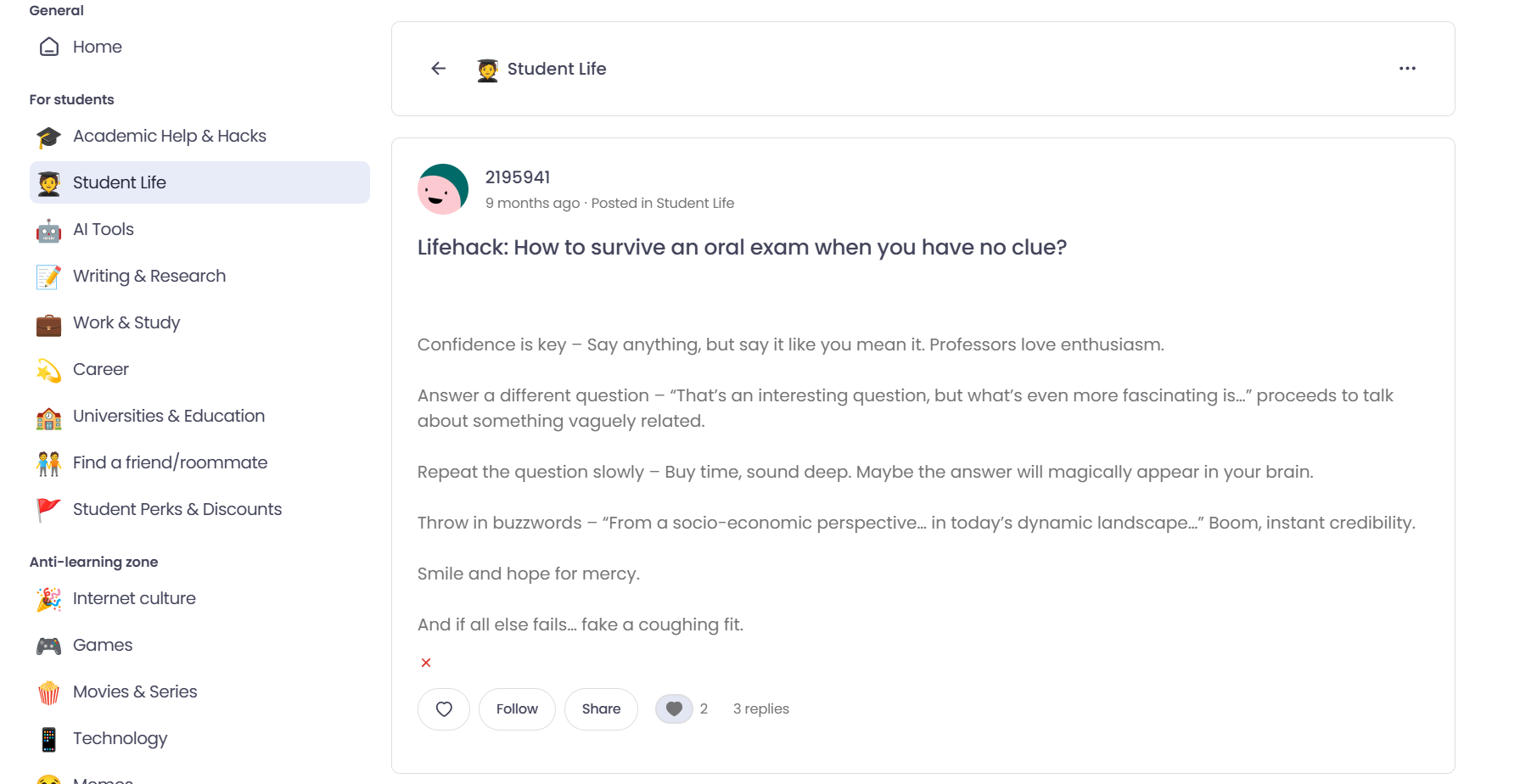Use this extensive guide to learn everything that you need to know about giving speeches. Nobody has to be born with an overwhelming amount of confidence and charisma to be good at speeches, even if that helps a lot.
Moreover, to deliver a great speech, you’ll need to come prepared with the written version of it. So, there’s no skipping this step. After that, it’s just practicing until it feels right. With the knowledge we will provide in this article, you can become more confident and skilled at speech writing.
We will also provide persuasive speech examples for you to have a clear reference for what you can write, so there’s no need to fret. Let’s go through this step by step with our write my dissertation service.
Writing a speech that sounds like ‘you’ is tough - join our self-intro thread and get peer support.

What We’ll Cover
Don’t skip anything in this article if you want to make a stellar self-introduction speech about yourself that delivers your message and leaves an impact on your audience. The impact that you want, of course.
On a side note, if you’re looking for expert writing help via the web, then EssayPro is a paper writing service with hundreds of expert writers ready for your beck and call.
Moving on, this article will help you with:
- Making a speech outline
- To learn what to say about yourself
- Writing a 2-minute speech
- Writing persuasive speeches
- Learning how to write in the correct tone, as well as learning how to create an interesting hook
This info will be very useful if you want to create a well-written self-introduction speech about yourself. '
What Is an Introductory Speech?
An introductory speech is a speech talking about yourself and particular aspects of yourself to persuade a crowd or perhaps reach a certain goal. Too burnt out? If you need a writer to help you make a speech, then you should consider outsourcing some of the writing to a professional.
But if you decide to take on the challenge of writing a self-introduction speech, after all, you should remember that the point of it is to communicate who you are to your audience first and foremost.
Start With an Outline
Preparation is key when writing an introductory speech. As an example, we’ve given you an entire speech outline that focuses on personal achievements at work and school. Of course, the content of your speech can change depending on the context. But the basic structure stays the same. Here it is:
Introduction. In the intro, state any fundamental information about you. This includes your full name, faculty, expertise, and college/university if you are attending one. Use a hook to get your audience invested in what you have to say.
Informative Body Part. If the goal is to persuade and present oneself in a good light through personal achievements, then the body part should be as straightforward as possible. You can start by talking about:
- Personal experiences and achievements
- Professional experience, work life, and professional achievements, your expertise, and specialty
- Social activities like volunteering, community work, charities, etc.
- Your educational background
Bonus Information. Include info on your skills, hobbies, and any additional languages you might speak.
Conclusion. You can write about future goals, dreams, and ambitions here.
You are slowly learning how to write a speech about yourself the right way. Keep reading.
What You Can Write About Yourself in a Speech
When writing and delivering an engaging ‘all about me’ speech, you can consider including the following (if it’s context-appropriate):
- Telling a personal story about your life and experiences
- Using quotes that motivate and inspire. Only use quotes that have a significant meaning to you
- Asking questions to further engage the audience
Speeches are similar to rhetorical analysis, so you might learn a thing or two from reading up on them. Moreover, there is no one way to answer the question ‘how to write a persuasive speech’, but you can interject these elements in between information about yourself to keep it dynamic.
Writing a Two Minute Speech About Yourself
If you want to write a 2-minute speech about yourself, then it’s important to write about what matters since time is so limited. If you want to freshen up your writing, review types of sentences for a memory boost. But don’t stretch yourself too thin.
Let’s look at an example of how to write a speech. Let’s say you’re writing a speech for a job opportunity. Here are some things you can keep in mind but can also be applied to other contexts:
- Mention your current job and your educational background, and don’t forget to talk about your dreams and goals.
- Get into detail. Mention what you did in your job and your professional achievements. Don’t be vague. You want to radiate confidence and provide concrete information.
- Talk with enthusiasm. Charisma can sometimes be seen from a mile. Do you think a recruiter would hire a monotonous and overly hesitant speaker over someone charismatic, precise, and enthusiastic?
Do you know anything about the case study format? If not, we urge you to read our blog article.


Persuasive Speech Outline
An introductory speech could also be persuasive, especially if you’re trying to get the audience to agree with your point of view. That’s the essence of a persuasive speech - to persuade. If you’re confused, start with a persuasive speech outline of the course. It could resemble this:
- Introduction: Include a hook, information about the topic, and perspective that you want to talk about, and then hit the audience with your thesis/claim.
- Body: Extrapolate on the points you made in the intro, just like in an essay. Start with the main ideas, then follow up with evidence.
- Conclusion: Restate the main idea/claim of your choosing. Restate your arguments, then write why you think your arguments are positive and have value. Then, depending on the context, call the audience to action.
And that basically answers the question of ‘How to write a speech outline for persuading?’. If you need some inspiration material - you can look up any TED talk. You’ll see that they tend to follow this structure pretty often.
Check out some narrative writing topics, the information may be helpful to you.
Persuasive Speech About Yourself
Speaking of persuasive speech examples, let’s look at an example of how to write a speech. If you need more references, then use ours below to refine your writing. It’s good to look at references since it can easily help you with any individual blocks in your creative process.
Persuasive Speech Example
Persuasive Speech for a Business Presentation
Step By Step Tips

We’ve come this far in answering the questions of ‘How to write a speech about yourself?’, and for those who are still confused - it’s okay. We’re going to break it down for you, simple and clear. Follow our step-by-step guide, and you’ll overcome hurdles while writing what you need to.
And on that note, if you're facing writing challenges, try our service for quick and reliable support. When your workload becomes overwhelming, getting a helping hand can make all the difference.
Now let’s go through our guide to help you learn how to start a speech about yourself and how to end a speech about yourself.
Tone of Voice
Let’s not forget to cater the language and tone of your speech to the context and audience. We’ve learned that in speeches for a change in education or career opportunities, it’s best to keep a professional tone of voice and highlight your achievements.
However, if the introductory speech is for a toast, or perhaps to persuade a general audience, a more relatable tone of voice is acceptable.
Write a Hook
A hook should be intriguing, attention-grabbing, strong, and catchy. Its goal is to capture an audience, so try to think of something that subverts the audience’s expectations. For example, if your speech is going to be about yourself, don’t start with, “My name is Jeff.” Start things with something like, “I’ve always wanted to speak in front of an audience and share what’s important to me, and here I am now.”
Any speech class deals with this part of a self introduction speech in great detail. It will help you capture the audience’s attention. And once you have that - you are pretty much golden. Any speech is about capturing the audience’s attention first and foremost.
Make an Outline
As we’ve stated time and again, an introduction speech about yourself should be written after you’ve made a solid outline. Outlines streamline the process of making the speech and can help clear out any brain fog as well as give you a sense of direction.
Write Your Speech
Now that you’ve got an outline, it’s time to take all the pieces together and write them down. And just like that, you’re halfway there already. By following what you’ve learned in the whole article, the writing part should have been made easier. Take the time to write your speech, edit it, and then it’s on to the next. Stick around to see an example of how to write a persuasive speech example.
Start with a short speech at first. A couple of sentences will be more than enough. You can then work your way up, adding some fluff to the opening statement, mentioning your professional life, and utilizing bullet points to make a stronger impression. Just be sure not to lose your main point, provide only relevant information without too much derailing, and use simple sentences to make a stronger impression.
You can also use some minimal prompts to push you in the right direction. Your first rough draft should not be perfect. But as you move forward, it should be getting better and better with every revision up until you arrive at your final draft. Introductory speeches require a lot of detailed feedback to polish. Run your draft by your friends, and see what they can help you with. This is going to be a turning point in your writing process. Public speakers are used to rehearsing their speeches multiple times in advance.
Practice It!
It’s crunch time. All the effort, preparing, writing, and researching ideas come down to this point. While there are individuals who are great at improvising, don’t take a chance if you’ve never given a speech before. It’s best to be prepared. Being prepared can help you gain confidence in what you’re saying. Even if you’re not very good at public speaking - this is how you make it work.
If you have enough time, you can even take a speech class. It will help you be more confident about your public speaking. Giving some smaller speeches could also help you improve your public speaking skills. A self-introduction speech is not really that hard. And public speaking is not a talent, it’s an acquired skill. So work on improving it.
If you’re still looking for ideas, then here are some about me speech ideas that can help and might still give you some more insight on how to write a good speech about yourself.
Don't forget that we provide coursework, research, nursing paper writing services. You can turn to us for any help.

Daniel Parker
is a seasoned educational writer focusing on scholarship guidance, research papers, and various forms of academic essays including reflective and narrative essays. His expertise also extends to detailed case studies. A scholar with a background in English Literature and Education, Daniel’s work on EssayPro blog aims to support students in achieving academic excellence and securing scholarships. His hobbies include reading classic literature and participating in academic forums.

.webp)





